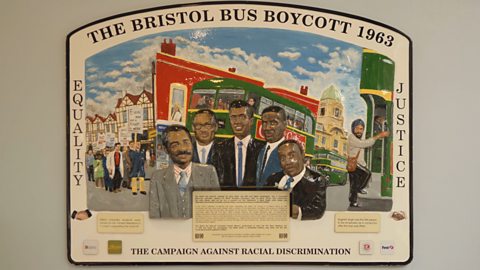HARLOW:Hi, my name is Harlow, and I'm nine years old. My family is from a tiny Atlantic island called Bermuda. Bermuda is a British Overseas Territory, one of only 14 countries left over from the British Empire. Although Bermuda is small, only 21 square miles, its people have a long history of travelling to far off places and storytelling. Recently, a national holiday was declared in the name of Mary Prince. Mary Prince was an enslaved person born on the island in the 1780s. Slavery is when one person is owned by another, like property. Her life was very difficult and, when she eventually escaped slavery and gained freedom, her story was recorded in a book called The History of Mary Prince, published in 1831. Mary's book is important not only because it helped lead the way to end slavery in Bermuda and throughout the British Empire, but because it marked the beginning of a rich literary heritage. In order to learn more I thought I would contact Yesha, who is a writer and teacher who specialises in books written by Bermudians. Just like Mary Prince, Yesha was born in Bermuda and has travelled far and wide, living in both London and Bermuda, all while writing her own stories.
YESHA:So I've been reading since as far back as I can remember. My mom was a librarian before I was born, so she had a huge love of books and literature. And so we used to read every night. I had a lot of books and we used to go to the children's bookstore or the library on Saturdays and we would get more books. So I was reading a lot and because I was reading a lot, I was writing a lot. I was writing little poems and short stories. When I turned about 14, 15, 16, I really wanted to rap, but my mom wasn't really too keen on that. So in order to trick her, I started writing a lot of poetry that I used to disguise as raps. And then that really stuck and I became a pretty somewhat professional poet. And I started writing more poems and more poems and more poems and competing in poetry competitions called slams. And then I went off to uni. Mary Prince, she is the first piece of Bermudian literature that we have. So when I was looking for Bermudian literature and doing history research and trying to figure out where I came from as a Bermudian writer, she was the first thing.
So this was the marsh near where Mary Prince was born.
YESHA (QUOTING MARY PRINCE): I was born at Brackish Pond in Bermuda, on a farm belonging to Mr Charles Myners. My mother was a household slave and my father, whose name was Prince, was a sawyer belonging to Mr Trimmingham, a ship builder at Crow Lane. Whan I was an infant, old Mr Myners died, and there was a division of the slaves and other property among the family.
YESHA: Mary's work was written well over two hundred years ago, at a time where reading and writing was forbidden and prohibited for enslaved black peoples. So whenever I'm in my home in London or in my home here in Bermuda, I'm always reminded of her contribution and how important it is, especially when I'm writing my own poems, writing my own short stories, editing my own work. I always think about her contribution and its significance.
Harlow, you are standing in a spot that was once where Mary's house was when she lived in the UK. Now, after her story was published, it was read all over the British Empire and it inspired so much change, which goes to show how huge and important and influential the written word can be.
HARLOW:Yesha, yes, this is where Mary once lived. Not much is known about her life here, but I think she must have missed her family very much, just like many people with homes in different countries.
YESHA:Mary Prince left the island multiple times. Now it wasn't on her own choice, but she had to because she was an enslaved woman and she had to constantly be moved around by the people who owned her at the time. But because of that, she was able to leave a bit of significance in each spot. As a person who has had to leave the island multiple times, for education, to get experience, to grow, I liken myself to her in that way, just being this nomadic Bermudian, this traveling Bermudian that continues to change at every place that she goes to.
HARLOW:Thank you, Yesha. It feels so good to know that the lives of people from long ago can live on forever in the stories that we write. And, no matter where I am in the world, Bermuda or the United Kingdom, I'm still connected to my community through a rich heritage of travel and storytelling.
YESHA:My mouth is a brackish pond. It's a stew of salt. There's a liturgy thumping in my chest to pelt my praises in sargassum. So I sound of cedar and of loquats in the spring, and surinam cherry jelly on fingers, of boys holding meditation and girls with kissed teeth.
Video summary
This short film tells the story of Yesha Townsend, a Bermudian poet who currently lives and works in London, and how she has been influenced by Mary Prince, a black woman who escaped from slavery.
Yesha speaks to nine-year-old Harlow, also from Bermuda, and describes how she has been influenced by Mary Prince (c.1788-1833). The film follows the story of both women and shows how a story told almost 200 years ago can still impact on the lives of people today.
Mary Prince’s Story
Mary was born at Brackish Pond (also known as Devonshire Parish) in Bermuda, a British overseas territory since 1612.
Both her parents were enslaved. Her father worked as a sawyer and was owned by David Trimmingham, and her mother worked in a house owned by Charles Myners.
Mary had five siblings who were all sold, along with her mother, as house servants to Captain Darrel when Charles Myners died in the late 1780s. At the age of 12, Mary was sold again for £38 (about £3,300 today) to Captain John Ingham. He was extremely cruel and often flogged Mary.
In 1806, Mary was sold to an enslaver on the salt ponds in The Turks and Caicos Islands. Conditions were poor and Mary often had to work 17 hours a day. In 1810, she returned to Bermuda with her master who was also extremely cruel. He often beat her and she stood up to him twice to defend herself and his daughter. He subsequently hired her out to Cedar Hill where she washed clothes.
In 1815, Mary was sold for a fourth time to John Adams Wood as a domestic slave. In 1826, Mary married Daniel James, a freeman, against the wishes of her master.
In 1828, John Adams Wood travelled to London taking Mary with him. It was here that she was able to finally escape and ended up working for a man called Thomas Pringle who was an abolitionist writer. Mary couldn’t travel back to be with her husband as she was still the legal property of John Adams Wood and would end up back in slavery.
In 1831, with the help of Thomas Pringle, “The History of Mary Prince” was published and caused a great deal of shock. On 28 August 1833, a law was passed that made slavery illegal in most British colonies through the Slavery Abolition Act (commencing 1 August 1834) and Mary was finally free.
Please note, Mary’s story could be upsetting for pupils. Mary was only a child when she was sold into slavery, and was only 12, a similar age to pupils, when sold again. A letter home prior to this video being shown in class is recommended. Mary’s experiences may be upsetting for pupils and themes including child slavery, abduction and physical abuse are explored. Pupils' families should be made aware of the content of the lesson in advance.
This short film is from the BBC Teach series, Black British Stories.
Teacher Notes
Before watching the film
Pupils could identify where Bermuda is on a map and discuss how this links to Britain. Give an overview of the British Empire and how since 1949, Bermuda has remained the oldest British Overseas Territory.
You may wish to discuss the British Empire and its involvement in the transatlantic slave trade of African people, possibly starting from Sir John Howkins in Tudor times, to George III declaring the trading of slaves illegal in the British Empire, through the Slave Trade Act 1807. However, it was not until the Slavery Abolition Act 1833 (commencing 1 August 1834), that Britain finally abolished slavery within most of the British Empire (called ‘The Commonwealth’ today). Emancipation Day anniversary events take place on 1 August each year in many countries to mark as a day of remembrance. However, please note that teaching of the British Empire is a key discussion point in education currently and that your school may have a particular policy or approach. Some teachers prefer to teach pre-slavery content (for example, African kingdoms), before lessons on empire and colonisation.
You may wish to discuss the written word and how influential it can be. Discuss with pupils whether they have ever read (or heard) something that has changed their opinion or made them want to change something.
Questions to consider
Depending on the focus of your lesson, you may wish to pause this short film at certain points to check for understanding, asking questions such as:
- Do you think it is important to read lots of different books as you grow up? Why?
- How do you think Mary Prince felt growing up in slavery as someone else’s ‘property’?
- Why do you think reading and writing was prohibited to enslaved Africans 200 years ago?
- How do you think Mary felt having to leave the island against her will?
- How might travelling around the world change your opinions or experiences?
- How can you be connected to a community through a rich heritage of storytelling?
- Why do you think it is important that Mary Prince’s story gets remembered and shared?
- Why do you think that there is a national holiday dedicated to Mary Prince?
- Should Emancipation Day be remembered in the UK?
Activities to further explore learning
Mary Prince’s storyPupils could research Mary Prince’s story and discover what life was like for her and other enslaved persons, growing up in slavery. Pupils could also research slave rebellions, and the important role enslaved people had in the abolition of slavery. Pupils could then write diary entries in role as Mary, focusing on particular aspects of her story. Please note, pupils could discover inappropriate resources if conducting independent research. Depending on your cohort, it may be best to provide materials.
Stories through poetryYesha has been influenced by Mary Prince and expresses herself through spoken poetry as we can see with her poem at the end of the video. Explore other types of poems with the pupils and challenge them to write their own poems based on Mary Prince’s life.
Influential writingThe film ends with the message that the written word is important and influential and can bring about change. Challenge pupils to think of a change that they want to bring about. This can be a personal change, like no more homework, or a bigger global change, like reducing plastic. Encourage pupils to write a letter to persuade the person in charge to lead the way towards change.
AutobiographiesThe History of Mary Prince was an autobiography written almost 200 years ago. Discuss what autobiographies are and ask pupils if they have read any autobiographies that have inspired them. Discuss the difference between an autobiography and a biography. Challenge the children to write their own autobiographies.
Key Vocabulary
- Colony - An area of land that is occupied and in control by settlers from another country.
- Cultural heritage - The ways of living developed by a community and passed on from generation to generation.
- Culture - A pattern of behaviour shared by a society, or group of people.
- Discrimination - The unjust or prejudicial treatment of different categories of people.
- Diversity - Differences in racial and ethnic, socioeconomic, geographic, and academic backgrounds.
- Emancipation - The process of giving people social or political freedom and rights. In terms of slavery, the act of freeing someone from slavery.
- Empire - Lands or regions that are controlled by one ruler or government.
- Enslavement – In this film we hear quotes from Mary Prince’s book where she talks about being “property” and a “slave”. Enslavement is the action of making someone a slave. A slave was considered property by law.
- Equality - When people are treated the same, regardless of what they look like or where they come from.
- Nomad_ - In this short film Yesha refers to herself as a nomadic Bermudian. A nomad is someone who moves from place to place, with no fixed residence. In this context Yesha is referring to needing to leave Bermuda for education, work and personal growth.
- Prejudice - A preconceived opinion that is not based on reason or actual experience.
- Racism - The belief that people of different races or ethnic groups have different value in society, and using this against them.
- Territory - An area of land under the jurisdiction of a ruler or state.
This short film is suitable for teaching KS2 / 2nd level pupils and links to various areas of the curriculum including to history (black history) and personal, social and relationships education (diversity and community). The focus on the power of the written word, specifically autobiographies and poetry, also provides a link with the English curriculum.
Cultural heritageThis short film raises questions about what makes up your cultural heritage and how this connects a community.
Inspiring changeThis short film raise questions about what inspires change today. Links can be made to movements that are current (Black Lives Matter, Extinction Rebellion, etc.), and how these movements have been inspired and developed.
Mac Williams - Working in the coal mining industry. video
In this short film Abiodun MacDonald Williams, known to his close friends as Mac, talks to his neighbour, 11-year-old Iris, about what it was like working as a ventilation officer in County Durham in the 1960s.
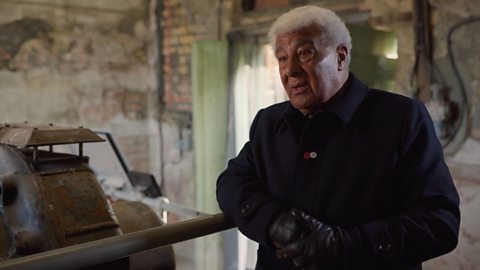
Alison Bennison - Working as a NHS nurse. video
This short film for primary schools follows Alison Bennison's journey to Britain from Barbados in 1960, to train as a nurse and work for the National Health Service. The story is told by Alison's granddaughter, Lindsey, and nine-year-old Dontay.
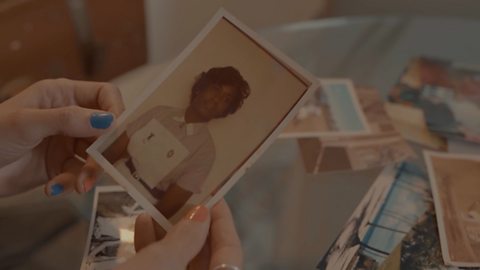
Christina Shingler - Becoming an author of children's literature. video
In this short film Felix, aged 10, talks to his grandmother Christina (Tina) Shingler, a writer who decided to do something about the lack of black characters in British literature.
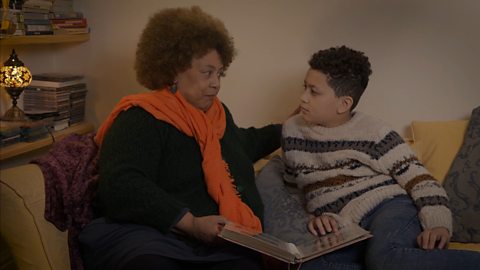
David Mwanaka - Becoming a farmer in Britain. video
In this short film 11-year-old Anashe meets David Mwanaka, and finds out about his journey from Zimbabwe to becoming a farmer in Britain.
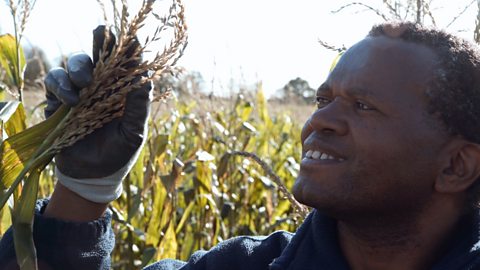
Dennis Morris - Becoming a photographer. video
This short film tells the story of Dennis Morris, a well-known photographer from London, originally from Jamaica, who photographed famous musicians including Bob Marley.
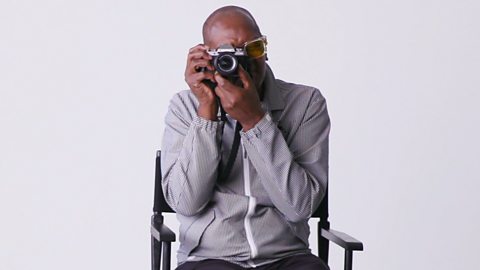
Elsie Owusu - Becoming an architect in Britain. video
In this short film 11-year-old Kendra meets Elsie Owusu, who moved from Ghana to the UK as a child and became an architect, and dealt with the challenges of working in a white, male-dominated profession.
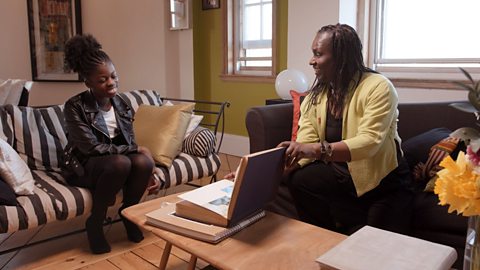
Eunice Olumide - Breaking into the fashion business. video
In this short film 12-year-old Lore meets Eunice Olumide, a second generation Nigerian who was born and grew up in Scotland and become a professional model.

Magid Magid - Becoming the youngest ever Lord Mayor of Sheffield. video
In this short film 14-year-old Abdirahman meets Magid Magid, a Somali-British activist and politician who served as the youngest ever Lord Mayor of Sheffield from May 2018 - May 2019.
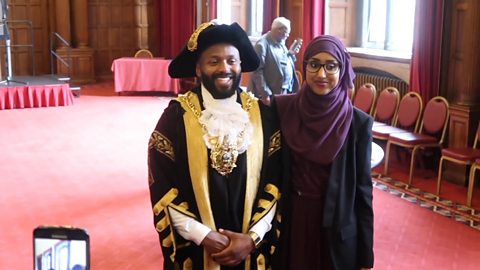
Vernon Samuels - The Bristol Bus Boycott of 1963. video
In this short film 13-year-old Amelia and Vernon Samuels, who represented Great Britain in the 1988 Olympics, tell the story of the Bristol Bus Boycott and Vernon's father, who was the first black bus driver in Bristol.
